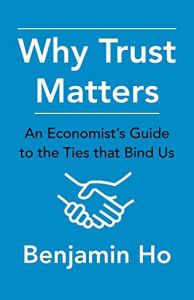Join getAbstract to access the summary!

Join getAbstract to access the summary!
Benjamin Ho
Why Trust Matters
An Economist's Guide to the Ties That Bind Us
Columbia UP, 2021
What's inside?
Looking at economic issues from the perspective of trust is surprisingly revealing.
Recommendation
While you might think the subject of trust more apt for a book about law or sociology, professor Benjamin Ho proves that looking at economic issues through the perspective of trust is both informative and thought-provoking. Much of economic study tends to focus on theoretical efficiency, but Ho’s emphasis on trust, in contrast, offers a more rounded, real-world view. His commentary is illuminating and useful for anyone concerned about the destructive levels of mistrust so prevalent in contemporary society.
Summary
About the Author
Benjamin Ho is an associate professor of behavioral economics at Vassar College and a faculty affiliate at the center for Global Energy Policy at Columbia University. He was also lead energy economist for the White House Council of Economic Advisers.






















Comment on this summary